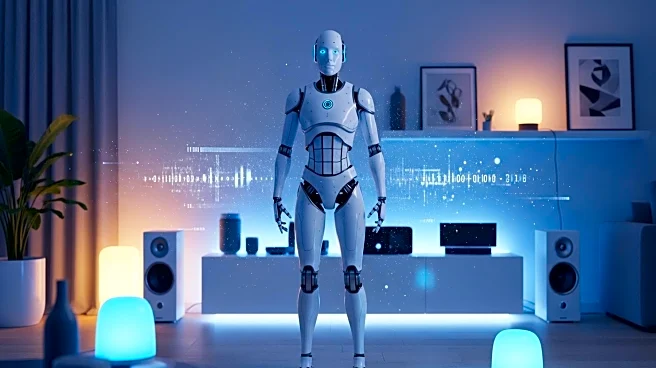What is the story about?
What's Happening?
Figure, a company specializing in humanoid robots, has launched its third-generation model, Figure 03, which has garnered attention for its potential in home automation. CEO Brett Adcock emphasized the importance of data in overcoming current limitations in robot functionality, suggesting that increased data input could enhance performance in tasks like laundry and dishwashing. Despite some operational challenges, such as difficulty in picking up fallen towels, Adcock remains optimistic about the future of humanoid robots in domestic settings. He envisions these robots performing tasks traditionally done by humans, thereby transforming home automation.
Why It's Important?
The development of humanoid robots capable of performing household tasks represents a significant advancement in home automation technology. If successful, these robots could revolutionize domestic life by reducing the need for human intervention in mundane chores, potentially freeing up time for other activities. This shift could impact various sectors, including labor markets, as demand for manual domestic work decreases. Additionally, the emphasis on data as a solution highlights the growing importance of AI and machine learning in enhancing robot capabilities, which could lead to further innovations in robotics and AI applications.
What's Next?
Figure's focus on data-driven improvements suggests ongoing research and development efforts to refine robot functionality. As the company continues to address operational challenges, it may seek partnerships or collaborations to enhance data collection and processing capabilities. The successful integration of humanoid robots into homes could lead to broader acceptance and adoption, prompting other companies to invest in similar technologies. This could result in a competitive market landscape, driving innovation and potentially lowering costs for consumers.
Beyond the Headlines
The introduction of humanoid robots into domestic settings raises ethical and safety considerations, particularly regarding privacy and cybersecurity. Ensuring that these robots operate safely and securely within homes is crucial to gaining consumer trust. Additionally, the potential for robots to perform tasks traditionally done by humans may lead to cultural shifts in how domestic work is perceived and valued. As robots become more integrated into daily life, societal attitudes towards automation and AI may evolve, influencing future technological developments.















